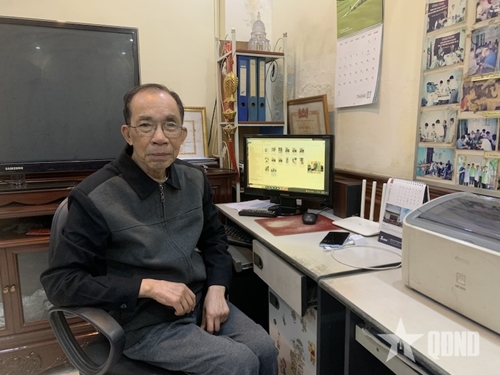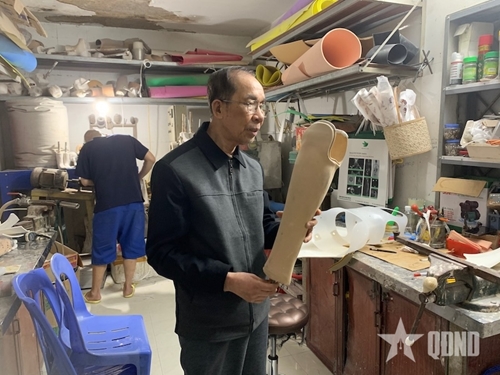From pain to desire to heal
In a small workshop in Goc De alley, Minh Khai ward, Hoang Mai district, Hanoi, the sound of metal being forged and plastic being shaped echoes like a melody of life. There, you can meet a thin man with bright eyes, carefully heating and bending a piece of thermoplastic. He is Le Thanh Do, who has spent 20 years crafting artificial arms and legs to help restore lives.
    |
 |
|
Wounded veteran Le Thanh Do |
His inspiration originated from personal experience. As a wounded soldier, he deeply understood the pain and struggles of losing a limb. He then pursued a medical career, aspiring to treat his comrades and others less fortunate.
While working at the Ministry of Labor, Invalids, and Social Affairs, he witnessed many cases struggling without limbs. “I have been hospitalized three times, so I know what they need, it’s not just a new leg, but the belief that they can live again,” he reflected.
A turning point came when he was sent on a six-month internship in the Netherlands. There, he learned modern orthotic techniques, how to work with semi-finished materials, and the structure of prosthetics. These skills became the foundation and motivation for his future: starting a workshop to build artificial limbs for people with disabilities.
In 2004, a year before retirement, he transformed his family’s small apartment into a makeshift workshop. The early days were full of hardship, like limited funding and a lack of equipment and specialized imported materials. “Back then, I had to mobilize every possible resource, even ask colleagues at State-owned workshops for help. But I believed that no matter how hard it was, I had to produce quality products to prove my capacity to potential sponsors,” he held.
As the workshop took shape, he met with his former students who are orthotic technicians trained through a Vietnam-Germany joint project where he had been a lecturer and deputy director. He persuaded them to join his humanitarian project.
In 2005, the workshop officially went into operation. A year later, an American expert working in Vietnam discovered it and decided to provide partial funding. Thanks to the support, the workshop’s equipment gradually improved. Do also seek other potential sponsors.
A meaningful journey
    |
 |
|
Do is a shining example of the spirit of Uncle Ho’s soldiers, whether in wartime or peacetime, always committed to serving the country and the people. |
Each year, his workshop runs a major project from April or May until December. The process starts when he receives referrals from disability associations, then prepares a detailed proposal, including initial consultations, medical records, materials, and labor costs, which he submits to sponsors for approval. Most of the funding comes from the Vingroup’s Thien Tam Foundation, with support from other benefactors and international experts.
Once approved, production begins. In each cycle, dozens of patients are selected, and Do dedicates himself to the work until the year ends. He meticulously stores each patient’s information for future reference.
He believed that deep expertise in materials and biomechanics is essential for crafting high-quality prosthetics. He regularly updates his knowledge, hones management and information technology skills, and improves his foreign language proficiency to communicate effectively with both donors and patients.
One case particularly touched him. “I remember a woman from Thuong Tin district, Hanoi, who lost both legs. After receiving the prosthetics, she began raising livestock and producing handicrafts for export, supporting herself and her family. Stories like that are what keep me going.”
Each person who comes to Do’s workshop experiences a profound renewal, not only in body but in spirit.
Do is a shining example of the spirit of Uncle Ho’s soldiers, whether in wartime or peacetime, always committed to serving the country and the people. From an engineering soldier defusing bombs near Ham Rong Bridge in Thanh Hoa province to a devoted teacher and now a life-changing companion to thousands of people with disabilities, he has written a remarkable story of perseverance, compassion, and a lifelong desire to contribute.
Looking back upon the journey, Do does not see it as a “successful career” but a meaningful path. Even with late-night work, financial concerns, and logistics challenges, the joy of seeing a patient smile and walk confidently on new legs is an encouragement for him.
Translated by Minh Anh